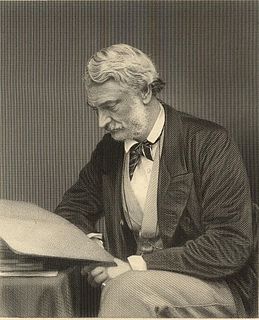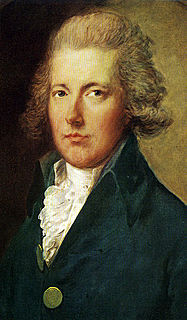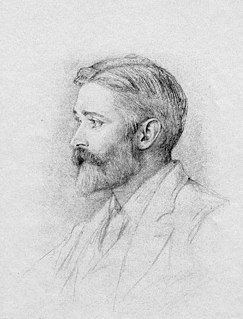Related Research Articles

John James Robert Manners, 7th Duke of Rutland,, known as Lord John Manners before 1888, was an English statesman.

Earl of Gainsborough is a title that has been created twice, once in the Peerage of England and once in the Peerage of the United Kingdom. The first creation ended in extinction when the sixth Earl died without heirs. However, the title was revived in 1841 for a female-line relative.

William Pitt the Younger led the government of the Kingdom of Great Britain from 1783 to 1801.
Edmund, Earl of Rutland was the fourth child and second surviving son of Richard Plantagenet, 3rd Duke of York, and Cecily Neville. He was born in Rouen. At the time Rouen was the capital of English-occupied France and his father held the office of Lieutenant of France. He was killed at the age of 17 either during or shortly after the Battle of Wakefield, during the Wars of the Roses.

Charles Manners, 4th Duke of Rutland, KG, PC was a British politician and nobleman, the eldest legitimate son of John Manners, Marquess of Granby. He was styled Lord Roos from 1760 until 1770, and Marquess of Granby from 1770 until 1779.

Rutland and Melton is a county constituency spanning Leicestershire and Rutland, represented in the House of Commons of the Parliament of the United Kingdom since 2019 by Alicia Kearns, a Conservative. It elects one Member of Parliament (MP) by the first-past-the-post system of election.

David Charles Robert Manners, 11th Duke of Rutland, is a British hereditary peer and landowner.

Charles Cecil John Manners, 6th Duke of Rutland KG, styled Marquess of Granby before 1857, was an English Conservative politician.

George Manners, 7th Earl of Rutland of Fulbeck Hall, Lincolnshire was an English landowner and politician who sat in the House of Commons between 1604 and 1626. He inherited a peerage as Earl of Rutland in 1632.

John Manners, 8th Earl of Rutland, was an English politician who sat in the House of Commons from 1640 until 1641 when he inherited the title Earl of Rutland on the death of his second cousin George Manners, 7th Earl of Rutland.

Henry John Brinsley Manners, 8th Duke of Rutland,, known as Henry Manners until 1888 and styled Marquess of Granby between 1888 and 1906, was a British peer and Conservative politician.
Rutland and Stamford was a county constituency comprising the area centred on the town of Stamford in Lincolnshire, and the county of Rutland. It returned one Member of Parliament (MP) to the House of Commons of the Parliament of the United Kingdom, using the first-past-the-post voting system.
Rutland was a parliamentary constituency covering the county of Rutland. It was represented in the House of Commons of the Parliament of the United Kingdom until 1918, when it became part of the Rutland and Stamford constituency, along with Stamford in Lincolnshire. Since 1983, Rutland has formed part of the Rutland and Melton constituency along with Melton Mowbray from Leicestershire.

Prior to its uniform adoption of proportional representation in 1999, the United Kingdom used first-past-the-post for the European elections in England, Scotland and Wales. The European Parliament constituencies used under that system were smaller than the later regional constituencies and only had one Member of the European Parliament each.

George Henry Finch was an English Conservative politician, who represented Rutland in the House of Commons for 40 years, becoming Father of the House of Commons.
Roger Flower or Flore was an English politician, 12 times MP for Rutland and four times Speaker of the House of Commons.

Rutland is a ceremonial county and unitary authority in the East Midlands, England. The county is bounded to the west and north by Leicestershire, to the northeast by Lincolnshire and the southeast by Northamptonshire.
Thomas Noel was a British politician who sat in the House of Commons in two periods between 1728 and 1788.

Alicia Alexandra Martha Kearns is a British Conservative Party politician. She has been the Member of Parliament (MP) for Rutland and Melton since the 2019 general election.
Bennet Sherard, 2nd Baron Sherard DL was a British politician and Irish peer. An influential landowner in Leicestershire and Rutland, he was returned to Parliament by the former county from 1679 through 1695, although his Parliamentary activity was minimal. He entered Parliament as a supporter of the Exclusion Bill, and was one of the Whigs purged from county offices in 1688 over James' policy of religious tolerance. He supported James' overthrow in the Glorious Revolution, and was appointed Lord Lieutenant and Custos Rotulorum of Rutland, offices he held until his death in 1700.
References
- ↑ "Rutland - History of Parliament Online". Historyofparliamentonline.org. Retrieved 3 March 2019.